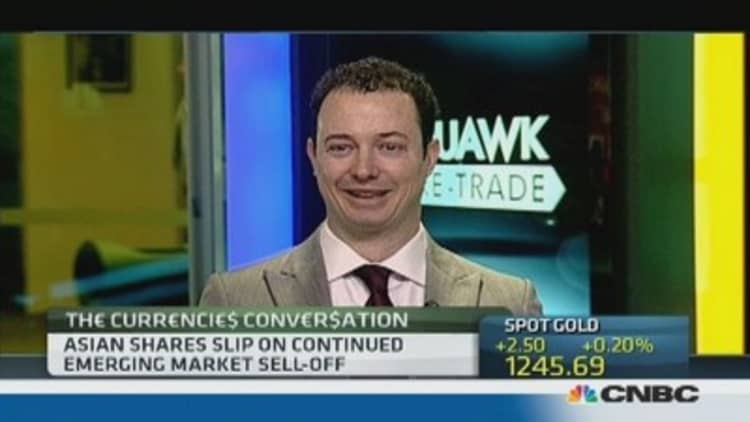The euro hit a two-month low against the dollar on Monday as expectations grew of radical European Central Bank action to head off the risk of deflation, while emerging market gloom helped push the U.S. currency down versus the yen.
The euro, which fell on Friday after weaker-than-forecast inflation data from the currency bloc, also plumbed a two-month trough against the yen and dropped to its lowest in more than six weeks against the Swiss franc.
The euro tumbled as far as $1.34765, its weakest since late November. It later recovered some ground to trade up 0.2 percent at $1.3512.
Euro zone inflation for January showed a surprise drop to 0.7 percent year-on-year. Analysts had expected prices to rise 0.9 percent.
Against the yen, the common currency hit a two-month low of 136.79 yen, facing the risk of settling below its 100-day moving average, now at 137.54, which some chartists could regard as a major bearish signal. It was last at 136.82 yen, down 0.6 percent on the day.
(Read more: Deflation worries back as euro zone inflation falls again)
With interest rates already at a record low of 0.25 percent, analysts increasingly expect the ECB to start buying sovereign bonds to loosen monetary conditions.

"What really matters is deflation," said Hans Redeker, head of global currency strategy at Morgan Stanley. "The euro is going to find it very difficult to hold its value.
"I think that with a ... fall in inflation and the development of deflation expectations the only credible instrument is outright QE (quantitative easing). It's not the best tool, but there's no other tool available."
(Read more: Too soon to declare euro zone victory: Draghi)
The euro dipped 0.3 percent against the Swedish crown to 8.7993 crowns after the Swedish manufacturing purchasing managers' index beat forecasts.
Global markets have been affected in recent days by a sharp sell-off in emerging markets, which has pushed up the value of the yen, traditionally seen as a safe haven.
Currencies
The U.S. PMI and payrolls data on Friday could signal the U.S. economy is growing fast enough for the Federal Reserve to keep cutting back its bond-buying programme - a move that encourages investors to pull back money from emerging markets to U.S. bonds.
"If the PMI is relatively strong, the possibility that will lead to a further eruption(in emerging markets) is quite high," added Morgan Stanley's Redeker, who expects dollar-yen to fall to 98 in the coming four weeks.
Against the , the dropped 0.8 percent to 101.23 yen.
(Read more: CNBC pollshows dollar bulls not giving up)
Still, the U.S. currency stood not far from an eight-week low of 101.77 yen hit last Monday as investors remained wary of emerging economies.
Since late last month, the prospect of a reduction in U.S. monetary stimulus and slower growth in China have raised fear of capital flight in some emerging economies that rely on foreign capital.

